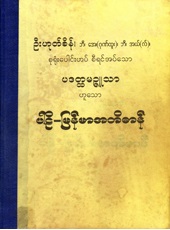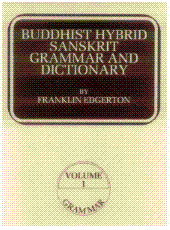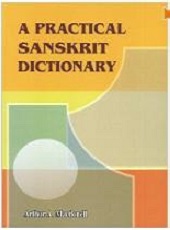



p135-1.htm




• A Practical Sanskrikt Dictionary,
by A. A. Macdonell, 1893,
http://www.sanskrit-lexicon.uni-koeln.de/scans/MDScan/index.php?sfx=jpg;
1929.
-
Nataraj ed., 1st in 2006, 2012.
-
https://dsal.uchicago.edu/dictionaries/macdonell/ 190516
• The Buddhist Hybrid Sanskrit Grammar and
Dictionary, BHS, vol.2, by F. Edgerton,
pp. 627.
-
FEdgerton-BHSD<Ô> /
Bkp<Ô> (link chk 180627)
• The Student's Pali English dictionary ,
by U Pe Maung Tin, 1920.
- (ref: UPMT-PEDxxx).
Downloaded copies in TIL
HD-PDF and SD-PDF libraries:
-
UPMT-PaliDict1920<Ô> /
bkp<Ô> (link chk 190113)
• Pali-Myanmar Dictionary
(in Pal-Myan), by U Hoke Sein,
- (ref: UHS-PMD). The dictionary in printed form is in TIL Research Library.
• Latin-English Vocabulary II, by Hans H Ørberg, 1998
-
HHOrberg-LinguaLatina<Ô> /
Bkp<Ô> (link
chk 190624)
Edited by U Kyaw Tun (UKT) (M.S., I.P.S.T., USA),
Daw Khin Wutyi, Daw Thuzar Myint, Daw Zinthiri Han
and staff of Tun Institute of Learning (TIL).
Not for sale. No copyright. Free for everyone.
Prepared for students and staff of TIL
Research Station, Yangon, MYANMAR
-
http://www.tuninst.net ,
www.romabama.blogspot.com
MC-indx.htm |
Top
MCpp-indx.htm
![]() {Dwa.}
{Dwa.}
p135-1c1
p135-1c2
p135-1c3
Orphans:
• धतोत्सेक
dhatotseka [
dhrita‿utseka ] -- a. haughty.
•
धूपिन्
dhupin [ dhûp-in ] a. perfuming
(--°).
![]() {Dwa.}
{Dwa.}
p134c3-b17/ not online

[DHVAMS] I.
-- dhvása , fall, fall in pieces, perish; go away, be off (only impv.);
ps. dhvasyte ; pp. dhvasta , fallen ; lost; disappeared; covered with
(in. or --°); cs. dhvamsáya , fell; pull down; destroy; violate; pp. ... (
end p134c3 )
(
p135-1c1-top
 )
)
p135-1c1-b01/ p087
• ध्वंस
dhvaṃsa [ dhvams-á ]
= ध ् व ं स
-- m. decay; loss; destruction, ruin, demolition:
-ka, a. destroying (--°); -kârin,
a. causing the destruction of (--°); violating (a woman).
ध्वंस dhvams-á
decay; loss; destruction, ruin, demolition: -ka, a.
destroying (--°); -kârin, a. causing the destruction of
(--°); violating (a woman).
p135-1c1-b02/ p087
• ध्वंसन
dhvaṃsana [ dhvams-ana ]
-- a. id.; n. destruction; -in, a. perishing; destroying.
ध्वंसन dhvams-ana
destruction; -in, a. perishing; destroying.
p135-1c1-b02/ p087
• ध्वज dhvaja [ dhvag-á ]
-- m. banner, flag, ensign; token, symbol;
liquor-seller's sign: -pata, m. flag;
-yashti, f. flag-staff; -vat,
a. adorned with flags; branded; m. distiller, liquor-seller;
standard-bearer.
ध्वज dhvag-á
banner, flag, ensign; token, symbol; liquor-seller's sign:
-pata, m. flag; -yashti, f. flag-staff; -vat, a. adorned
with flags; branded; m. distiller, liquor-seller;
standard-bearer.
( end p135-1c1 )
p135-1c2-b00/ p087
• ध्वजाहृत
dhvajahrta [ dhvaga‿âhrita ]
-- pp. taken at the standard, captured on the battle-field.
ध्वजाहृत dhvaga̮âhrita
taken at the standard, captured on the battle-field.
p135-1c2-b01/ p087
• ध्वजिन्
dhvajin [ dhvag-in ]
-- a. adorned with a flag, bearing a standard; branded;
m. distiller, publican.
ध्वजिन् dhvag-in
adorned with a flag, bearing a standard; branded; m.
distiller, publican.
p135-1c2-b02/ p087
• ध्वजिनी
dhvajini [ dhvagin-î ]
-- f. army.
ध्वजिनी dhvagin-î
army.
p135-1c2-b03/ not online
![]()
• [dhvagî-kri]
-- make a standard of
p135-1c2-b04/ not online

• [1. DHVAN]
-- ¹ only aor. ádhvanî , be extinguished (anger) : ...
p135-1c2-b05/ not online

• [2. DHVAN] I. P.
-- ² dhvana , sound, roar; buzz; cs. ...
p135-1c2-b06/ p087
• ध्वनन
dhvanana [ dhvan-ana ]
-- n. sounding;
allusion, indication.
ध्वनन dhvan-ana
sounding; allusion, indication. ( end p135-1c2 )
p135-1c3-b00/ p087
• ध्वनि
dhvani [ dhvan-í ]
-- m. sound; cry; noise; thunder; figurative style;
allusion, indication; -ita, pp. n. sound; noise; thunder.
ध्वनि dhvan-í
sound; cry; noise; thunder; figurative style; allusion,
indication; -ita, pp. n. sound; noise; thunder.
p135-1c3-b01/ p087
• ध्वन्यात्मक
dhvanyatmaka [ dhvanya‿âtmaka ]
-- a. inarticulate (sound).
ध्वन्यात्मक
dhvanya̮âtmaka inarticulate (sound).
p135-1c3-b02/ p087
• ध्वसिर dhvasira [ dhvas-irá ]
-- a. bestrewn, covered; dusty, obscured; -ti,
f. disappearance; one of the four states of a Yogin
in which all the consequences of actions disappear;
-ra, a. withered; falling off.
ध्वसिर dhvas-irá
bestrewn, covered; dusty, obscured; -ti, f. disappearance;
one of the four states of a Yogin in which all the
consequences of actions disappear; -ra, a. withered; falling
off.
See my note on the Path of a Yogi
p135-1c3-b03/ p087
• ध्वाङ्क्ष
dhvanksa [ dhvấṅksha ]
-- m. crow.
ध्वाङ्क्ष
dhvaNṅksha crow.
p135-1c3-b04/ p087
• ध्वान
dhvana [ dhvân-a ]
-- m. murmuring; sound.
ध्वान dhvân-a
murmuring; sound.
p135-1c3-b05/ p087
• ध्वान्त
dhvanta [ dhvân-ta ]
-- (pp.) n. darkness (also pl.).
ध्वान्त dhvân-ta
darkness (also pl.).
p135-1c3-b06/ not online
• [DJVRI] I. P.
-- dhvára , bend, fell, destroy
( end p135-1c3 )
From Wikipedia: http://en.wikipedia.org/wiki/Seven_stages_Yogi 120403
According to Vedic and Hindu philosophy, every Yogi goes through Seven stages of development before achieving complete liberation. The following is taken from the commentary on the Yoga Sutras by Vyasa.
The seven stages are grouped into two phases:
1. The first four stages form the first phase where the Yogi is liberated from the 'products of mental processes', (i.e.) results of his thoughts.
2. The last three stages form the second phase in which the Yogi is liberated from the mind itself.
Stage 1:
"That which is to be known is known by me". At this stage the yogi realises that all true knowledge comes from within oneself, and the mind becomes satisfied that meditation will lead to all truth.
Stage 2:
At this stage the yogi recognises the causes of his sufferings, uses this knowledge to free himself from those causes and hence becomes free from pain.
Stage 3:
The yogi attains full discriminative knowledge of the state of samādhi, in which the Yogi is completely absorbed into The Self.
Stage 4:
The yogi no longer needs to carry out acts (religious duties) as he has attained the end of all acts through discrimination.
Stage 5:
At this stage the yogi becomes free of all waverings of the mind, (i.e.) The yogi obtains complete control over all mental processes.
Stage 6:
The mind of the yogi becomes free of the influences of external natural processes whenever he desires so.
Stage 7:
The Self of the yogi becomes identical with Purusha and the state of absolute freedom (kaivalya) is achieved.
Go back Path-Yogi-note-b
End of TIL file